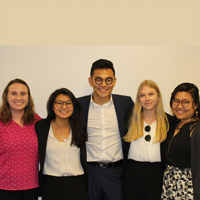Collaborative Research as the Key to Advancing AI
IBM Research is a Lab and Center member of CRA.
 IBM’s Cognitive Horizons Network is advancing the science behind cognitive computing by working with the best minds in the world.
IBM’s Cognitive Horizons Network is advancing the science behind cognitive computing by working with the best minds in the world.
Just about every day we learn about a new application of cognitive computing. From predicting schizophrenia to analyzing Wimbledon fan experiences, cognitive computing and artificial intelligence have arrived and are making a measurable difference in our daily lives.
But with all the excitement around real-world applications of this powerful technology, it is easy to forget that the Cognitive Era, as we call it at IBM, is still in its infancy. And there is a tremendous amount of work yet to be done.
Collaborating with leading minds around the world is the key to fulfilling the true potential of cognitive computing. And that’s why IBM formed the Cognitive Horizons Network (CHN), a network of the world’s leading universities committed to working with IBM to accelerate the development of core technologies needed to advance the promise of cognitive computing.
Currently, members of the network are focusing on seven topics:
Video comprehension – Massachusetts Institute of Technology (MIT): Developing machines that can emulate the human ability to understand inputs from multiple video streams and predict potential future events in real-time. The lab will address technical challenges around both pattern recognition and prediction methods in the field of machine vision that are currently impossible for machines alone to accomplish. For instance, humans watching a short video of a real-world event can easily recognize and produce a verbal description of what happened in the clip as well as assess and predict the likelihood of a variety of subsequent events, but for a machine, this ability is currently impossible. This collaboration with MIT will bring together leading brain, cognitive, and computer scientists to conduct research in the field of unsupervised machine understanding of audio-visual streams of data, using insights from next-generation models of the brain to inform advances in machine vision.
Cognitive environments – Rensselaer Polytechnic Institute (RPI): Building environments that explore and advance natural, collaborative problem-solving among groups of people and machines, with the goal of improving how people work together to make decisions. The lab is built around a futuristic “Situations Room” that can be adapted to industry-specific environments (including Cognitive Boardrooms, Design Studios, Diagnosis Rooms and Immersive Classrooms) and is designed to surface new ways to improve how people work together.
Optimized systems – University of Illinois at Urbana Champaign (UIUC): Developing the stack of applications, accelerators, software, hardware and networking needed to support larger and more complex cognitive workloads. With the increased computational demands of cognitive computing, the researchers will further optimize Power Systems for cognitive workloads. Researchers will have access to the OpenPOWER Foundation’s systems technology as well as technical development and support from IBM Systems Group. The new hardware designs and cognitive algorithms will be released to the open source community and OpenPOWER Foundation, of which both IBM and the University of Illinois are members.
Conversational technologies – University of Michigan: Developing technology to allow people to interact more naturally and effectively with computers through text or speech dialogues. The lab will develop a cognitive system that functions as an academic advisor for undergraduate computer science and engineering majors at the university. The system will allow researchers to explore how smart machines interact with people in goal-driven dialogues. To do this, the team will capture and annotate large volumes of approved recorded human-to-human conversations between undergraduates and their advisors on topics such as course selection, career advice, extracurricular recommendations and homework resources. The team will use these conversations to train the system on how to respond to interactions with students, and ultimately learn how to automatically navigate and successfully reply in conversations with those using the system.
Deep learning – Université de Montréal’s Montreal Institute for Learning Algorithms (MILA): Developing next-generation deep learning algorithms and techniques to help computers improve their understanding and interpretation of language, speech, and vision. The lab conducts advanced research in basic sciences on artificial intelligence, machine learning and deep learning, exploring areas such as generative modeling, unsupervised learning, representation and optimization.
Cognitive Cybersecurity – University of Maryland, Baltimore County (UMBC): Applying cognitive computing to cybersecurity via analytics and machine learning, while also exploring specialized computer power optimized for these new intensive computing workloads. The lab explores new ways to apply cognitive technologies – which are able to digest, learn from, and reason over vast amounts of structured and unstructured data – to help cybersecurity professionals gain an advantage in the battle against cybercrime. The research in the lab is conducted on IBM and OpenPOWER technology. The IBM Power Systems being implemented in the lab at UMBC are infused with acceleration technology from the OpenPOWER Foundation, making them ideally suited for cognitive and advanced analytics workloads, critical to the cyber security work the researchers will be conducting. In addition, researchers will receive technical development and support from IBM Systems Group.
Health Empowerment – Rensselaer Polytechnic Institute (RPI): how the application of advanced cognitive computing capabilities can help people to understand and improve their own health conditions. The center’s vision is to advance the understanding of chronic disease prevention through data-driven discovery and analysis of factors that can help predict the propensity to develop chronic conditions and provide personalized health recommendations and lifestyle guidance for clinicians to deliver to their patients. Specifically, the center plans to develop cognitive tools for health empowerment that use analytics, knowledge-driven learning, and semantics-based interrogation to address data-to-knowledge gaps to enable clinicians and patients to help manage and prevent of chronic diseases and conditions.
This ongoing collaboration is critical to make the promise of AI a reality for business and society. Though we have made incredible strides over the last several years — since IBM Watson first competed on and won Jeopardy! — there are several areas of computer science, engineering, cognitive science, and application domains like medicine, accounting, and law that need to be advanced and brought together if cognitive systems are going to meet the demands of the digital world. In fact, the entire cognitive computing stack — from how people collaborate to make decisions to building advanced computing infrastructure — must be evolved if we are to meet the needs of a demanding world.
For more information about IBM’s Cognitive Horizons Network, please click here.
About the Author
Brent Hailpern received a Ph.D. degree in computer science from Stanford University in 1980. His thesis was entitled ‘‘Verifying Concurrent Processes Using Temporal Logic.’’ Hailpern joined IBM’s Thomas J. Watson Research Center as a research staff member in 1980, where he worked on and managed various projects relating to issues of concurrency and programming languages. From 1999 to 2004, he was the associate director of computer science for IBM Research. From 2004 to 2011, he managed departments at Watson Research covering programming languages, software engineering, and human-computer interaction where he was the director of programming models and tools, with a worldwide responsibility for IBM Research’s strategy and research agenda in software technology. From 2011 to 2013, he was the director of the computer science department, IBM Research – Almaden. In 2014, he became a distinguished research staff member, head of computer science for IBM Research, and co-lead for the IBM research cognitive platform and tool strategy.
Hailpern is a Fellow of the ACM and the IEEE. He is a past secretary of the ACM, a past member of ACM Council, a past chair of the ACM Special Interest Group on Programming Languages (SIGPLAN). He has chaired or co-chaired several SIGPLAN conferences and was a co-chair of the 2014 CRA Conference at Snowbird. Hailpern is currently a member of the CRA Board of Directors (2011-present) and the NSF Directorate for Computer and Information Science and Engineering (CISE) Advisory Committee (2012-present).









